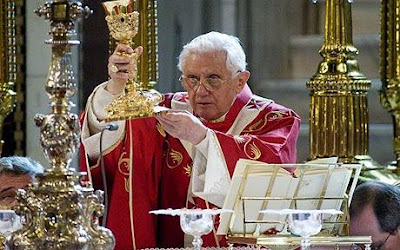In the 1960s, there was a movement to translate the Latin words “pro multis” into the vernacular not as “for many” but “for all.” Pope Benedict XVI has explicitly stated that all vernacular translations should be rendered as “many” and not the universal “all.” He is referring to biblical translations, but more importantly, the consecration of the chalice in the Holy Sacrifice of the Mass:
Take this, all of you, and drink from it: for this is the chalice of my Blood, the Blood of the new and eternal covenant, which will be poured out for you and *for many* for the forgiveness of sins.
Prior to the current revised English Missal, you may remember that this was translated as “for you and for all.”
This controversy over “many” or “all” became a rallying point of traditionalists who objected to “all” as a liturgical novelty. On the other hand, liturgical progressives celebrated the “for all” translation as being inclusive.
Regrettably, the liturgical radicals won the day back in 1970. The Novus Ordo of the 1970s and until recently, in certain vernacular translations (eg, English and German), translated the words of consecration as “poured out for you and for all.” Pope Benedict, however, has put his foot down. The translation “for all” is not considered a correct translation.
Pope Benedict, in his recent letter to the German bishops (March 15, 2012), writes:
This exegetical consensus has know shattered; it no longer exists. In the German translation of Sacred Scripture the account of the Last Supper states: “This is my Blood, the Blood of the Covenant, which is shed for many” (Mark 14:24, cf. Matt. 26:28). This indicates something very important: The rendering of “pro multis” with “for all” was not a pure translation, but an interpretation, which was and remains very reasonable, but is already more than translation and interpretation.
Pope Benedict has noted that “many” is a Hebrew expression derived from the Old Testament Scriptures. It refers to the faithful remnant of Israel. At the Last Supper, Christ our Lord was referring to Himself as the Suffering Servant that justifies “many.”
“Because his soul hath laboured, he shall see and be filled: by his knowledge shall this my just servant justify many, and he shall bear their iniquities” (Isaias 53:11).
The dissenting argument that this “many” necessarily entails “all” has been, as Benedict puts it, shattered. Christ’s death does not justify all human beings unconditionally. Christ’s death justifies the many that receive Him by faith and preserve the bond of charity.
Dissenting theologians would like for us to believe that an abstract “Cosmic Christ” justifies all human persons and that all religions are transcendental appropriations of this “Cosmic Christ.” Our Holy Father is highlighting that the true Catholic Church is in fact a remnant just as the true Israel of the Old Testament was a remnant. It is like the yeast that is spread through the lump of dough or the seeds that are buried in the earth.
Moreover, the Eucharist is offered to all, but it is not to be received unconditionally “for all.” All are invited to the Sacrificial Banquet of the Lamb, but only those who are baptized, hold the entire Catholic Faith, are in a state of grace, and have kept the Eucharistic fast are allowed to partake of Christ the Lord.
Pope Benedict concludes:
We are many and we stand for all. In this way both words, “many” and “all”, belong together and relate to each other in responsibility and promise.
Here the Holy Father sums up the distinction beautifully. The faithful partakers of the Eucharistic Lord are “the many” described by Isaiah and applied to Himself by Christ. Yet, the Catholic Church “stands for all” and offers to the Gospel of Christ to all. No one is excluded from this invitation. However, each person excludes himself by lack of faith, hope, and charity. It’s a careful nuance with a critical distinction.



Comments Policy: I reserve the right to delete comments that are offensive or off-topic. If your comment contains a hyperlink to another site, your comment automatically goes into "Comments Purgatory" where it waits for release by way of moderation.